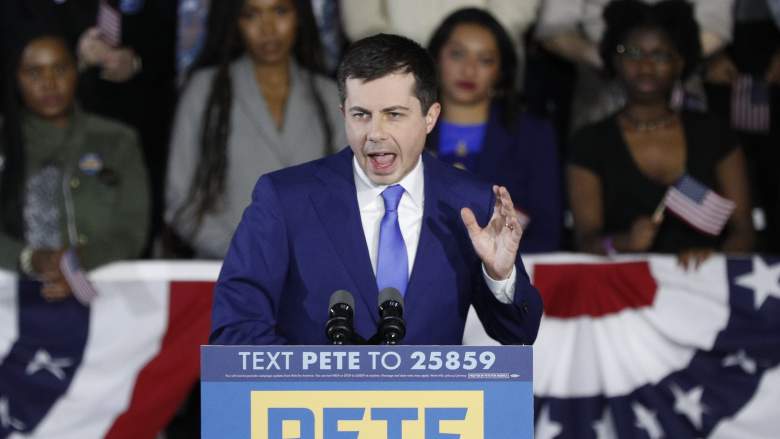
Getty Pete Buttigieg decalres that his campaign has moved on from Iowa "victorious" in a caucus-night speech before supporters.
Iowa did not go as anyone planned might be the understatement of the early political year. From confusion about rules, to technical failures, to more confusion about rules, the 2020 Iowa Caucus was a muddled mess.
With the Iowa Democratic Party reporting 100 percent of the vote in, none of the vote-reporting services, including Decision Desk HQ, have declared a winner. It’s simply too close and with too many open questions to say much of anything for sure about the final results.
That may not matter though. Iowa has always been considered, “a momentum, not a delegate play.” The state’s 32 pledged delegates usually don’t mean all that much in the grand scheme in the race to a majority at the nomination convention. What generally does matter are the vaunted “tickets out of Iowa” and any polling bounce the winner gets. Given the nature of the results, everyone is getting out of Iowa.
Amy Klobuchar had hoped to capitalize on her Midwestern background and status as a Senator from neighboring Minnesota to land a surprisingly strong finish to give her a bounce into New Hampshire. That probably would have meant fourth-place ahead of either Elizabeth Warren or Joe Biden. She didn’t get there but she was the first candidate to speak on election night and put a positive spin on the night. Then she got on a plane to New Hampshire.
For the rest, confusion was the order of the night with no results available. Pete Buttigieg came closest to declaring outright victory on caucus night (before walking it back the next morning, sort of). Bernie Sanders pronounced himself pleased with his clear lead in the raw vote totals. While Joe Biden eventually admitted the results were, “a gut punch”.
So what does this all tell us going forward and the trends to keep an eye on?
Iowa Polling vs. the Final Results
There is a lot of focus on polls and this was our first chance to compare them to actual votes.
Here’s the Real Clear Polling average vs. the actual result in the first round of voting:
| Sanders | 23/24.8 |
| Biden | 19.3/15 |
| Buttigieg | 16.8/21.3 |
| Warren | 15.5/18.4 |
| Klobuchar | 9/12.7 |
The clear miss was with Biden and Buttigieg, two candidates generally considered to be fighting for a similar slice of the electorate in Iowa and New Hampshire.
As for the traditional post-Iowa winner bounce, Nate Silver says it’s looking like Buttigieg is getting it even though on paper it was something much more akin to a tie.
It All Comes Down to Turnout
Democrats were able to turn out a lot of voters in 2018 when they took back control of the House of Representatives. They are banking on continuing to successfully ride that wave of energy in 2020. In Iowa at least, we didn’t see that. Participation was closer to 2016 levels and not the record-breaking numbers of 2008. Perhaps somewhat more concerning for Democrats is entrance polling showed a steep decline in the number of first-time caucus-goers.
One of the longstanding criticisms of the caucus system is that it’s hard to participate in compared to a traditional primary, so maybe this is one of the many anomalies of Iowa this year. Still, it’s worth watching going forward.
Iowa In The Rearview Mirror
One data point doesn’t make a trend, but it starts to give us a baseline to compare the upcoming results.
Something important to remember though, the primary isn’t as linear or as narrowly focused as it seems. While we watch New Hampshire, Nevada, and South Carolina, so are voters in Super Tuesday states. Many of them aren’t just watching, in places like California, Minnesota, North Carolina, and Texas, they are about to start voting or already are. The trends that move voters in the February states are having the same or similar effects on voters in those states. The money woes that cause cutbacks in Nevada and South Carolina are magnified in more expensive states like California and Texas.
Oh and don’t forget the $55 billion gorilla in the room. In the wake of the chaos in Iowa, Michael Bloomberg casually announced he’s doubling the size of his already enormous investment in advertising and staff.
Whichever candidates survive the maelstrom of February are going to run into a large, incredibly well-funded campaign that’s had the filed to itself for the most for months.
The most predictive thing about Iowa this year might just be the thing will remember it for the most: Chaos.
READ NEXT: No, Joe Biden Didn’t Say He Eats the Stick in Corn Dogs